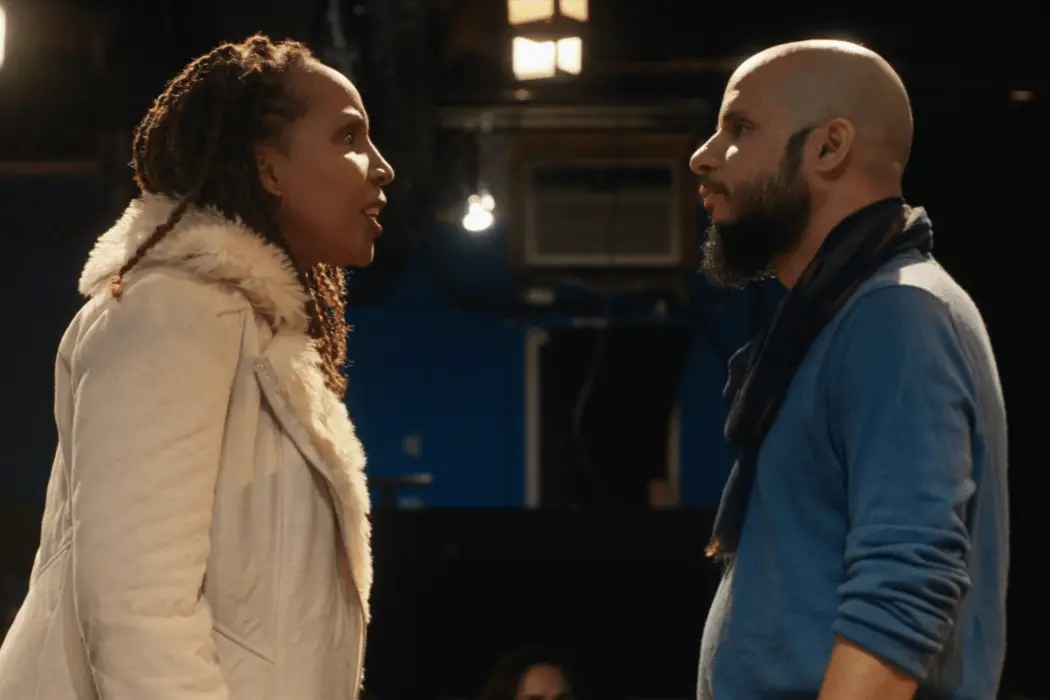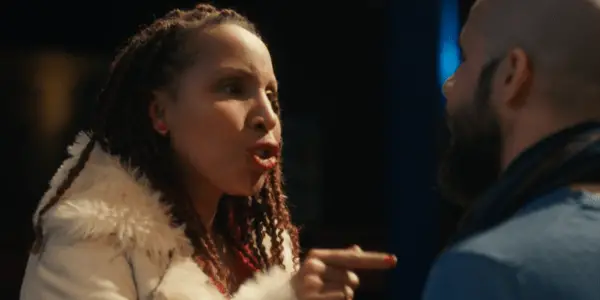SHADOW ACTING: A Tense, Contained Drama

Jules Caldeira is an Associate Editor for Film Inquiry based…
For fiction writers, a commonly-heard tip is to “write what you know.” In that same vein, actors can be told to use personal experiences to help elicit more authentic emotions within their performances.

Subscribers to Stanislavski’s methods know this well. But what happens when an actor is told to dig too deep, and an acting coach pushes too far? In Lawrence “Law” Watford’s latest short, Shadow Acting, we explore along with the actors searching for that honesty within their work, and as it happens, within themselves.
When Acting Gets Too Real
Interior: An acting class in New York City. Students are paired up for scenes with tense, improvisational conflict. Stella (Genia Lear Morgan), an older student, comes in late. She’s thrust into the next scene by her teacher (Bobby DeJesus), an argument between a tired wife and her husband (Benjamin Cardona) who has a new get-rich-quick “investment opportunity.” With nearly every line, Stella is stopped for criticism. She’s told to “react, not respond,” to “pull back from human doing and lean into human being.” She works through her frustration and these vague corrections, but soon the tension bleeds from the scene into the real world. She draws from her own experience, but is continually asked to dig deeper and is grilled about her character’s thoughts, feelings, and motivations. Does she love him? Does she believe in him? The hostility rises as the teacher gets more personal with his jabs, even citing her latest, poorly-reviewed performance. Had this film been longer, he might have reached Terence Fletcher-level insults reminiscent of Whiplash.

In a brisk seventeen minutes, Watford delivers a story about finding honesty within our behavior, and the conflict that arises from differing perspectives of the same issue. From the moment the director interjects with his first “cut,” the tension is palpable between Morgan and DeJesus. With tight two-shots and frantic glances to the grimaces faces of the other students watching this unfold, the camera puts us onstage with them, right in the middle of the arguments that arise. As the film comes to its saddening conclusion, it feels all too real, as it might when the struggles of reality and fiction blur and simply saying “and scene” won’t be able to solve it this time.
Conclusion:
Shadow Acting is a commendable piece of work. As much as I would like to see the stories of these characters more developed, I think the sharpness of a tense drama condensed into short format better serves this story. The cast, particularly Morgan and DeJesus as well as Judeline Charles and the other students, provide an authentic feel to this film, and I would have been happy to watch each of their scenes play out as well. If this is indicative of Watford’s work, I look forward to perhaps seeing a feature-length project in the future.
For more information, visit DivineWritePictures.com.
Does content like this matter to you?
Become a Member and support film journalism. Unlock access to all of Film Inquiry`s great articles. Join a community of like-minded readers who are passionate about cinema - get access to our private members Network, give back to independent filmmakers, and more.
Jules Caldeira is an Associate Editor for Film Inquiry based in Sacramento, CA. He's a drummer, part-time screenwriter, and full-time Disney history nerd who can be found on social media when he remembers to post, and can be contacted at [email protected].













